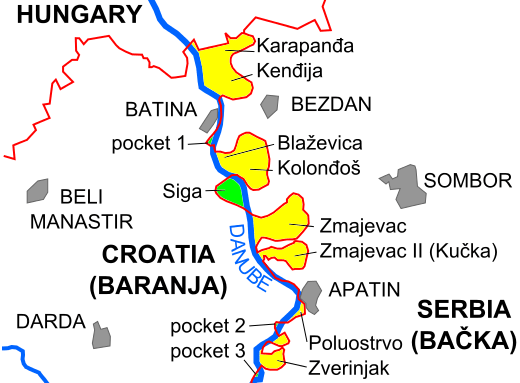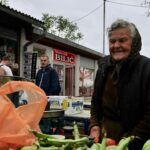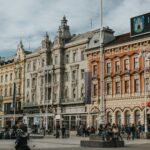TCN visited Piran Bay on December 30, 2017, to find out how Slovenia’s implementation of the arbitration judgment was affecting local Croatian fishermen. More on that in a subsequent article, but could Croatia’s refusal to accept the judgment lead to another potential Liberland on the border between Croatia and Slovenia due west of Zagreb?
The focus of Croatian/Slovenian tensions is currently centred on Piran Bay following Slovenia’s decision to implement the judgment, which saw 80% of the bay being award to Slovenia. Implementation went into effect yesterday, with three Croatian fishing boats turned back by a Slovenian police boar and fines of up to 40,000 euro per boat reported in the Slovenian media.
We will return to a much more detailed look into the situation on the ground with the fishermen of Croatia’s northernmost Adriatic settlement, Savudrija, in a separate article shortly, but a totally unrelated aspect of the border arbitration caught my eye while doing some background research – a military barracks on top of Sveta Geva, due west of Zagreb. The break-up of former Yugoslavia has brought many border disputes to Croatia – read the TCN overview of ongoing Croatian border disputes from earlier this year – one of which led to the self-proclamation of the Free State of Liberland by Czech national, Vit Jedlicka, back in 2015.

Jedlicka claimed 7km2 on the western banks of the Danube under a law called ‘terra nullius’, as the land had been claimed by neither Croatia or Serbia after the break-up of former Yugoslavia. Serbia wanted to use the Danube as the natural border, keeping everything east of the river, while Croatia wanted things done according to the 19th century catastar map, when the Danube flowed differently The catastar map contained significantly more land on the Serbian side than the 7km2 of Jedlicka’s Liberland, and so Croatia did not take the land, so as to keep alive hopes of the greater eastern prize. Jedlicka saw his chance, nipped in and planted his flag. Almost three years later, the story of Liberland is getting stronger by the day, and has progressed much further than the global headline one-day publicity stunt it was dismissed as.
Moving back to the border arbitration judgment… Wikipedia tells us:
“At the top of Sveta Gera, at an altitude of 1178 meters, there are a telecommunication tower and a military barracks whose location is strategically important to Croatia. Barracks was used by the Yugoslav People’s Army (YPA) until early 1991 when its soldiers withdrew from the site following breakup of Yugoslavia. In June of the same year, Slovenian soldiers entered barracks on the basis of an oral agreement between Presidents of Slovenia and Croatia, Milan Kučan and Franjo Tuđman. Croatian President Tuđman considered that it would be better for Croatia to avoid conflicts with a friendly Slovenian army in the west since the country was threatened by hostile YPA from the east. Although Slovenian army announced many times that its soldiers would leave the barracks, particularly in 1998 and 2000, it didn’t happen. In 2004, President Kučan stated in an interview for Večernji list that it was time for the Slovenian soldiers to leave the barracks, adding that there wasn’t a sufficient will of the Slovenian governing officials to do so. On 29 June 2017, the Arbitration Tribunal of the Permanent Court of Arbitration that was deciding on another border dispute between Croatia and Slovenia, mentioned in its verdict that Sveta Gera indeed belonged to Croatia but that it neither had jurisdiction to decide on the matter nor it could order Slovenian soldiers to withdraw.”
Slovenia is now implementing the arbitration decision (just ask Savudrija’s fishermen), and so by rights they should vacate the military barracks at Sveta Gera (they are technically now a military force on foreign soil), and it they did vacate, would Croatia take over the territory? By doing so, they would be tacitly accepting the findings of the arbitration, which they are vehemently opposed to and do not recognise.
So once more, there could be a piece of unclaimed land on a Croatian border, which someone might feel inspired enough to claim under ‘terra nullius’.
The Slovenia Times, in a detailed look at the arbitration decision, suggests that the Slovenian military is looking for a Croatian handover before vacating:
“On land the main possible point of conflict is Trdinov vrh (Sveta Gera in Croatian), a strategically important peak on which there is a Slovenian military installation.
“The portion of the peak containing the military installation has been awarded to Croatia and Slovenia plans to honour the arbitration award and hand it to Croatia.
“However, Prime Minister Miro Cerar has said Slovenia is only willing to do so in line with official handover procedure for military installations.
“Croatia is unlikely to consent since it would constitute admission of the tribunal’s award; unofficial information suggests Slovenian troops will stay at the installation until a formal handover is made, which from Slovenia’s perspective would mean that it would have a military installation on the neighbouring country’s territory.”
There are other pockets of land which have been ruled on with this arbitration process, and for those looking to start their own country, perhaps there is an opportunity to follow in Liberland’s footsteps, although rest assured – the road to recognition will be rocky.
TCN’s visit to Savudrija showed that events on the ground will necessitate practical dialogue between Croatia and Slovenia to solve day to day problems for Croatia’s fishermen. Some 26 years after dependence, there are still many border issues unresolved, and it will be interesting to see how the Croatian-Slovenia border definitions take hold without Croatian engagement in the process. (NB It should be noted that Croatia withdrew from the arbitration when it was revealed that one of the arbitration officials was proven to have been in contact with the Slovenian Ministry of Foreign Affairs to discuss how to present Slovenia’s case, while the official had also lobbied for Slovenia).








